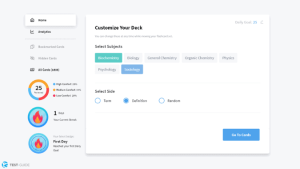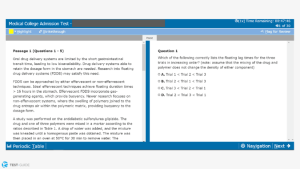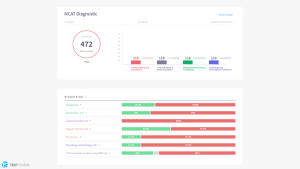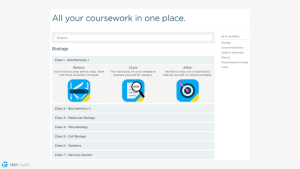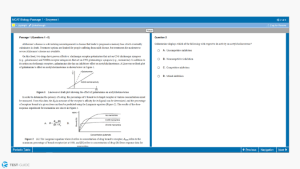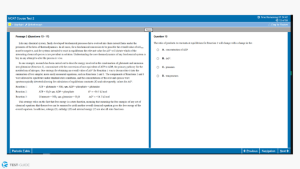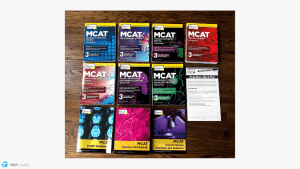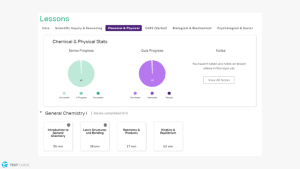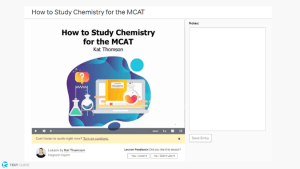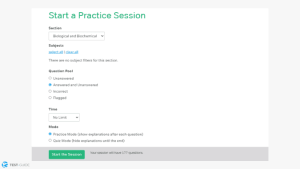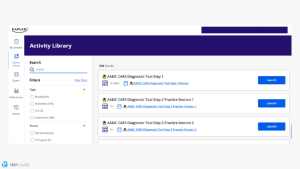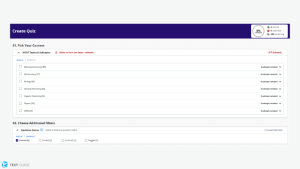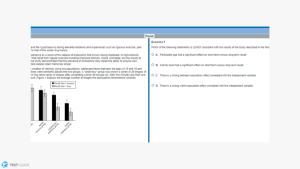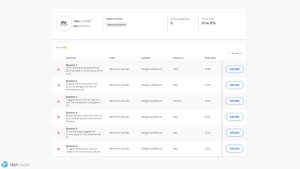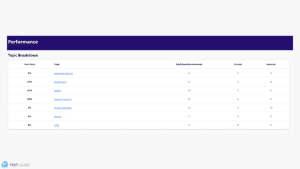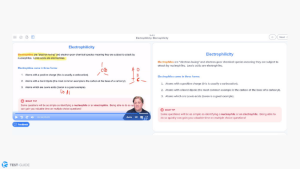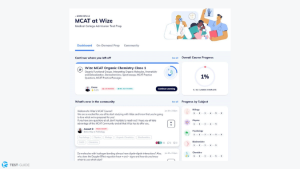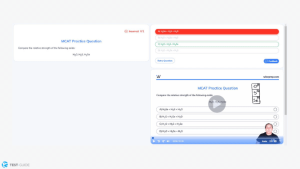Use one of the best MCAT prep courses listed below to achieve a top score.
Our team actually went into these MCAT prep courses and looked for features and content we liked and didn’t like. Use the screenshots we provided to get a look intside the courses.
Many factors were taken into consideration including price, content, practice questions, and course guarantees.
Summary: We reviewed the best MCAT prep courses and compared them below. We also included screenshots of these courses.
Best MCAT Prep Course Reviews (2023)
| MCAT Prep | Blueprint MCAT | Princeton Review | Magoosh | Kaplan | Wize |
|---|---|---|---|---|---|

|
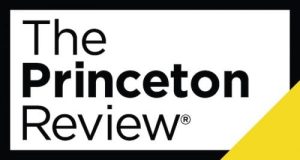
|

|

|

|
|
| Rating |
94 |
93 |
86 |
81 |
77 |
| Best For | Best Overall | Best for In-Depth Learning | Best Value | Best for Options | Best for Short-Term Studying |
| One of Our Picks | TG Recommended | TG Recommended | TG Recommended | TG Recommended | TG Recommended |
| Pricing |
$2,099 $1,599 View Discount |
$1,999 $1,699 View Discount |
$499 $399 View Discount |
$1,999 $1,699 |
$899 $809 View Discount |
| Subscription Length | 6 Months | 12 Months | 12 Months | 6 Months | 6 Months |
| Free Trial | Yes | No | Yes | No | Yes |
| Guarantee | Score Increase Guarantee | Higher Score Guaranteed | +10 Point Improvement | Higher Score Guaranteed | Satisfaction Guaranteed |
| Practice Questions | 10,000+ | 2,500+ | 740+ | 3,000+ | 900+ |
| Practice Exams | 15 | 16 | 3 | 16 | - |
| Delivery Options | Self-Paced or Live Online | Self-Paced or Live Online | Self-Paced | Self-Paced or Live Online | Self-Paced |
| Videos | Yes | 500+ | 380+ | Yes | 150+ Hours |
| Study Plan | Yes | Yes | Yes | Yes | Yes |
| Books Included | Yes | Yes | No | Yes | No |
| Detailed Analytics & Insights | Yes | Yes | No | Yes | No |
| Social Score (% Negative Reviews on Internet) | 7% | 11% | 7% | 9% | Not Enough Data |
| Summary | Review | Review | Review | Review | Review |
| Learn More |
Our Picks for Best MCAT Prep Courses
- Best Overall – Blueprint
- Best for In-Depth Learning – Princeton Review
- Best Value –Magoosh
- Best for Different Options – Kaplan
- Best for Short-Term Studying – Wize
Best MCAT Course Video Review
Blueprint: Best Overall
TG Recommended
Best For
- Bite-sized video lessons
- Advanced analytics and reports
- Number of practice questions
Not Recommended For
- Someone needing to study for an extended period of time
Key Decision Making Factors
Price
Not the cheapest course but great value for everything included.
Guarantee
Higher score guaranteed when taking this course.
Content
Bite-sized lesson videos. Quizzes sprinkled into lessons to ensure learning.
Questions
10,000+ practice questions. 15 practice exams.
Pros and Cons
Pros
- Analytics + features of course
- Custom study plan builder
- Number of practice questions
Cons
- Subscription length
What to Expect – Hands on Walkthrough
There is no way around it, Blueprint is a top MCAT prep course. It made our list for being the best overall. You will have the following options to choose from:
- Self-Paced Course – Starting at $1,599
- Live Online Course – Starting at $1,999
Both options include the same “base” features and come with 10,000+ practice questions and 15 practice tests.
One of our favorite features is the customizable study schedules for students – these schedules are created automatically by asking students various questions about their timeline and availability. The study schedules will plan out every day and tell you which lessons and modules you need to complete that day. It is a very cool tool and one of the best study schedules we have ever seen.
The student dashboard is the first thing students will see when they login to their account. The dashboard is nice because your daily tasks show up at the top (based on your custom study schedule). You can easily navigate to where you need to be within the course on that day.
Users will find all of their lecture materials in the “resources” tab. They are organized into modules and consist of lecture videos and mini quizzes. The lecture videos vary in length but Blueprint does a good job of keeping them shorter in order to keep your attention (4-10 minutes).
The quizzes that are sprinkled into the modules are a nice touch and really ensure you are grasping the concepts taught. The videos are great quality and consist of the instructor talking while the slides are animated in the background – it gives a feeling like you are in an actual classroom setting.
The analytics in this prep course are second to none. After taking a practice exam, you will see just about everything you could imagine about how you did. You will see a breakdown of each section, how you did time wise on each section, how you did on different types of questions, and more.
Users can also visit the “analytics” tab to see more insights on how they are progressing through the course and see data on how they did on section specific exams and questions they have answered in the question bank.
The “Qbank” tab is another area of the course where students can practice answering questions. Students can create custom practice sets based on what they want to work on. There are a bunch of filters that can be applied when creating custom practice sets, so you can get really specific with this if you want.
In addition to the custom practice sets, users can also create custom flashcard study sessions. These flashcard study sessions are similar to the custom question practice sets but consist of flashcards instead.
The prep course comes with 15 months of access to all online AAMC resources, including AAMC’s full-length exams and practice questions. Another cool feature of the course is the access granted to office hours.
Blueprint offers 2-hour sessions, 5 days a week, that feature MCAT instructors teaching and answering questions on specific MCAT topics. They call these “office hour” sessions. If you cannot make one of the live office hour sessions, they are all recorded and put in your account so you can sort through them and watch them later at your own convenience.
The course has a great feel to it and users will find it is very easy to navigate. The custom study plans and technology baked into the course are some of our favorite features.
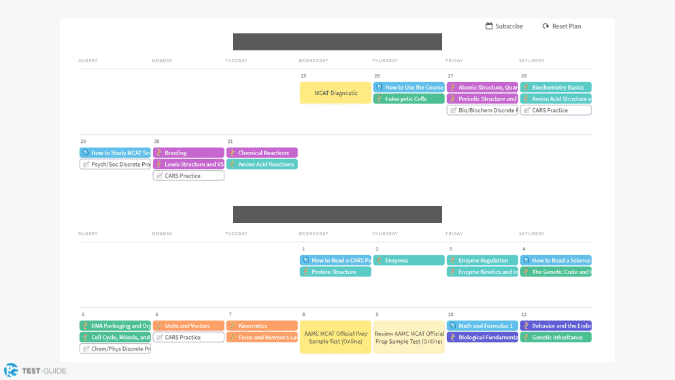
Additional Screenshots
Key Features
- 10,000+ practice questions
- 15 full-length practice exams
- Bite-sized video lessons
- Customizable study plan
Key Differences from Other MCAT Courses
- Number of practice questions
- Customizable study plan is more advanced than other providers
- Overall technology/reports and user interface is more advanced than other courses
Differences from Previous Versions
- More practice questions
- More advanced analytics
TG Recommended

Score: 94
Why Choose Blueprint MCAT
- Bite-sized video lessons
- Advanced analytics and reports
- Number of practice questions
Princeton Review: Best for In-Depth Learning
TG Recommended
Best For
- Students looking for something comprehensive
- Students looking for tons of videos
- Students looking for tons of practice exams and questions
Not Recommended For
- Students shopping on a budget
Save 15% With Code: DEVMCAT15
Key Decision Making Factors
Price
Middle of the pack in terms of price. Still a great deal.
Guarantee
Higher score guaranteed when using this prep course.
Content
500+ videos. 10 MCAT books. Diagnostic exams.
Questions
1,000+ practice questions. 16 practice exams.
Pros and Cons
Pros
- Subscription length
- Number of practice exams
- Materials provided with course
Cons
- 500+ videos is a lot, maybe a bit too much
What to Expect – Hands on Walkthrough
Princeton Review made our list of MCAT prep by being the most in-depth. If you decide to prep with Princeton Review, you can choose from one of the following options:
- Self-Paced Course – $1,699
- Live Online Course – $2,399
- MCAT 513+ – $3,199
- MCAT 515+ Immersion – $6,449
All of the options above build on each other and come with 1,000’s of free-standing and passage-based questions – all of which have detailed answer explanations. The course also comes with 16 full-length online practice tests and includes every piece of material release by the AAMC.
One cool feature of this prep course is the detailed score reports used to gauge a student’s progress. The course has diagnostic exams that measure a student’s improvement in each different MCAT subject.
These diagnostic exams will help save students time and focus on the subjects they need to be improving on. The 16 practice tests also come with detailed score reports to help students focus on the material they struggled the most with.
The Princeton Review provides students with 500+ videos to help learn the material and include 10 MCAT books for students. Of the 10 books, 3 are exclusive titles for Princeton Review students, while the other 7 are subject-specific MCAT review books.
If you are looking for some live online instruction, you should consider the Live Online course, MCAT 513+, or MCAT 515+ Immersion. These options include everything in the self-paced course, as well as additional online instruction from MCAT experts.
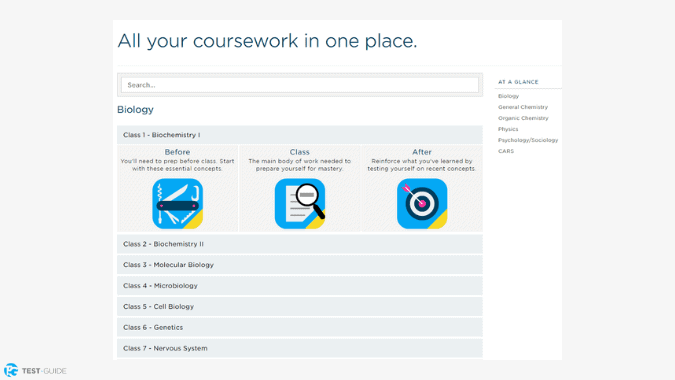
Additional Screenshots
Key Features
- 2,500+ practice questions
- 16 full-length practice exams
- 500+ videos
- Different learning options for everyone
Key Differences from Other MCAT Courses
- Number of full-length practice exams
- Different learning options available
- Good job of integrating textbooks with the online course technology
Differences from Previous Versions
- Increased subscription length
- Updated user dashboard
TG Recommended

Score: 93
Why Choose Princeton Review MCAT
- Very comprehensive
- Materials provided with course
- # of different options offered
Save 15% With Code: DEVMCAT15
Magoosh: Best Value
TG Recommended
Best For
- Someone shopping on a budget
- Someone who wants a great score improvement guarantee
- Someone who enjoys bite-size videos versus long lecture videos
Not Recommended For
- Someone looking for a lot of practice questions or exams
Save 10% With Code: TESTGUIDE1
Key Decision Making Factors
Price
Best Value. Cheapest course we reviewed BY FAR.
Guarantee
Only course that provides a set score improvement – +10-point improvement.
Content
Includes 380+ videos. Study schedules for students.
Questions
700+ practice questions. 3 practice exams.
Pros and Cons
Pros
- Price
- Subscription length
- Score improvement guarantee
Cons
- Light on the number of practice questions
What to Expect – Hands on Walkthrough
Magoosh made our list of MCAT courses by being the best value provider. Magoosh keeps it super simple and offers 2 potential options to choose from:
- 1-Month Premium – $379
- 12-Month Premium – $399
The courses are online and self-paced. They both include the same exact features, with the only difference being the amount of time you get access to everything.
You can expect to find:
- More than 380 video lessons to cover all sections of the MCAT
- 3 practice tests
- 700 practice questions
All practice questions have detailed answer explanations to help explain the material to students.
The course is self-paced and completely online but includes study schedules to keep students on track. Magoosh MCAT covers all MCAT subjects and focuses specifically on subjects and topics that will appear the most on the MCAT. This Magoosh prep course is compatible with all computers, tablets, and smart phones.
Magoosh offers a 1-month, 3-month, and 6-month study plan. While the study plan is not as customizeable as the one Blueprint offers, it still gives you tasks to complete everyday and helps make studying for the MCAT more manageable.
The first thing users will see when they login to their course is the dashboard. Users will be able to track their progress for each section of the MCAT on their dashboard. They will be able to see things like the number of lessons reviewed and the number of questions answered for each subject.
In addition, students will also see an estimated score for each section on their dashboard. This estimated score will change (hopefully increase) based on your progression through the course.
Students will learn a majority of the content via the “lessons” tab. Magoosh breaks down the lessons by sections on the MCAT. Each section is further broken down into various topical series. Finally, each of those topical series is broken down into very specific topics.
For example, in the Biological & Biochemical section, there is a series called Cell Bio which has lectures on specific topics like DNA & RNA, Cell Membranes, Cellular Reproduction, and more.
The lecture videos consist of the instructor talking over slides. The instructor does make notes and add some interactive elements to make the videos a little more interesting. Most of the videos fall in the 8 to 12 minute range. There is an area to make your own notes to the right of the video and the transcript of the video is provided below.
When students are ready to get some practice in, they can visit the “practice” tab. They can create custom practice sessions based on which section of the MCAT they want to work on. There are some filters that can be applied as well as selecting practice mode or quiz mode – practice mode shows answer explanations after each question while quiz mode waits until the end.
Students can also find the full-length practice exams under the “practice” tab. Students wishing to take a full-length exam should be prepared to set aside 7 hours and 30 minutes.
Students who wish to review old questions can do so under the “review” tab. There are a bunch of filters you can select like which section of the MCAT, which subject on the MCAT, questions you were slow to answer previously, and more.
Magoosh MCAT offers a free 7-day trial with no commitment. The free trial includes 60 MCAT lessons and 16 practice questions – a great way to get your feet wet and experience the course. Magoosh also guarantees a 10-point improvement on your MCAT or you will get your money back.
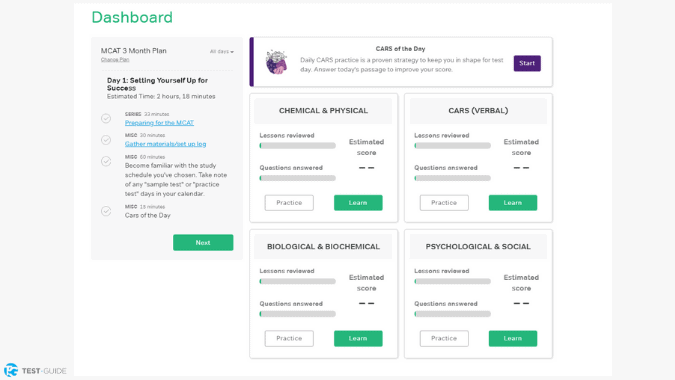
Additional Screenshots
Key Features
- 740+ practice questions
- 3 full-length practice exams
- 380+ videos
- +10 point improvement
Key Differences from Other MCAT Courses
- Price. Most affordable course we reviewed by far.
- +10 point score improvement
Differences from Previous Versions
- Improved user interface
- Improved reporting
TG Recommended

Score: 86
Why Choose Magoosh MCAT
- Very affordable
- Subscription length
- Score improvement guarantee
Save 10% With Code: TESTGUIDE1
Kaplan Review
Kaplan
Best For
- Someone looking for practice questions
- Teacher-led sessions
- Different prep options
Not Recommended For
- Someone needing to study for an extended period of time
Key Decision Making Factors
Price
$1,699 for 6 months of access to the course.
Guarantee
Higher score guaranteed when taking this course.
Content
Hundreds of videos available to students. 90+ teacher-led sessions on their MCAT channel.
Questions
3,000+ practice questions. 16 practice exams.
Pros and Cons
Pros
- Number of practice questions
- Number of practice exams
Cons
- Price
- Subscription length
What to Expect – Hands on Walkthrough
Kaplan is on our list of best MCAT prep for having a plethora of options to choose from. Some of those options include:
- Self-Paced Course – Starting at $1,699
- Live Online Course – Starting at $2,099
- In-Person Course – Starting at $2,399
- Bootcamps – Starting at $6,199
As you can see, there is an option for everyone with Kaplan. You can expect the same core features within the courses. The biggest things that change are live online hours and the format in which you learn.
The course comes with 16 practice tests and thousands of practice items. This course includes hundreds of videos available to students to help learn the material. Kaplan also provides 90+ teacher-led sessions on their MCAT channel that are livestreamed and on-demand.
Included in the course are 8 MCAT prep books that are filled with proven strategies, information on science, and more practice questions. In addition to the books, students gain access to the most official AAMC practice materials.
The question bank developed by Kaplan adapts to your answers and your knowledge level and builds out the questions based on your insights – this is a nice feature to help save students time.
Overall, Kaplan has developed a solid course. It can become a little pricey, but well worth it if you find an option that fits your needs.
The number of practice questions, practice tests and adaptive learning styles are on-par with other courses. The access to AAMC materials and the books included are a nice add-on too. Kaplan does not offer a free trial.
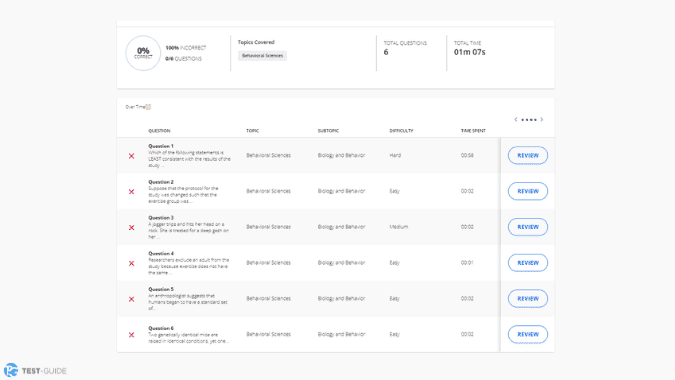
Additional Screenshots
Key Features
- 3,000+ practice questions
- 16 full-length practice exams
- 90+ videos
- Different learning options
Key Differences from Other MCAT Courses
- Offer 24, 2-hour long video lectures instead of shorter videos like other courses
- Can sort through topics discussed in the lecture videos to quickly jump around
Differences from Previous Versions
- Added 70+ videos
Kaplan

Score: 81
Why Choose Kaplan MCAT
- High number of practice questions
- Well-known provider with experience in test prep industry
- Variety of options to choose from
Wize Review
Wize
Best For
- Someone looking for high quality videos
- User interface of course
- Short-term studying
Not Recommended For
- Someone wanting full-length practice exams
Save 10% With Code: wizeup10
Key Decision Making Factors
Price
On the lower end of pricing when it comes to MCAT prep courses.
Guarantee
Satisfaction guaranteed but no definitive score increase or hard number guaranteed.
Content
150+ hours of video content. Lessons organized well and easy to follow. Videos are of great quality.
Questions
Questions are good and presented well, but lack of practice exams brings the course down.
Pros and Cons
Pros
- Price
- Video quality
Cons
- No practice exams
- Lack of a guarantee
What to Expect – Hands on Walkthrough
Wize’s core offering is their self-paced MCAT course. They offer that option in 3 different ways:
- 1-Month – $299/Month
- 6-Month – $150/Month
- 12-Month – $112/Month
Wize is unique in that they offer a 1-month option. This is very uncommon in the MCAT prep industry. We really like this feature and think it is great if someone wants to brush up on their studies before the exam.
Overall, our team was pleasantly surprised with the course. The course has an easy-to-follow layout and design. The video quality was amazing and the lectures were very informative and easy to comprehend.
The videos feature an instructor who highlights and makes notes on their slides. This is a cool way to teach the material and gives the student the feeling they are learning in a classroom setting.
There are more than 150 hours of video content feature in this course. The course is well-organized and guides users through topics and sub-topics in a logical way. The videos feature the lecture notes to the right of the video so users can easily follow along.
In terms of practice questions, the course includes 900+ questions. Students will find practice questions sprinkled throughout the courses. Each “class” also contains practice passages where students will review a reading passage and answer various questions about that passage.
One thing we did not like about this course is the lack of full-length practice exams. While this is a downfall, it is not a deal breaker. Students can easily learn everything they will need with this prep course. Practice tests can be supplemented in other ways if needed.
Wize added 1:1 strategy calls to their course offerings. You can use these strategy calls to speak with an expert and to figure out concepts that are giving you trouble.
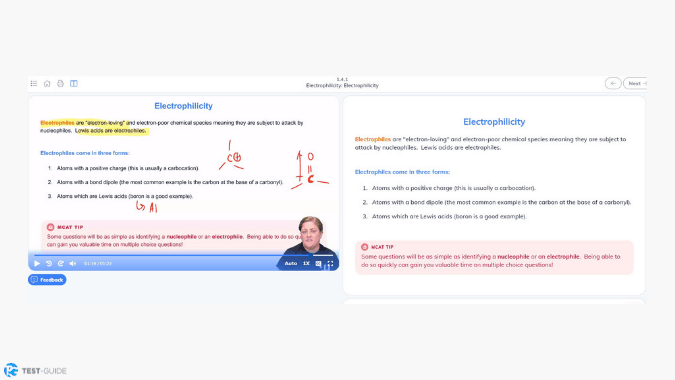
Additional Screenshots
Key Features
- 900+ practice questions
- 150+ hours of video
- High quality videos
Key Differences from Other MCAT Courses
- Quality of videos
- Overall layout of course
Differences from Previous Versions
- Addition of unlimited 1:1 strategy calls
Wize

Score: 77
Why Choose Wize MCAT
- High quality videos
- Friendly user interface
Save 10% With Code: wizeup10
How to Choose a MCAT Course
Selecting the right MCAT prep course can be the difference between getting into medical school or not. There are a wide range of options available. Our goal is to help you understand your options and choose the best MCAT prep course based on your needs.
What to Consider When Purchasing a MCAT Prep Course
There are many important things to consider when purchasing MCAT prep. However, the most important thing to consider is your specific needs. Are you someone that has trouble focusing and lacks motivation sometimes? If that is the case, you may want to consider a LiveOnline option or an option that is more like a classroom setting.
Price
Price is the first thing many students consider when purchasing MCAT prep. While this is an important factor, it should not be the only factor. Students should look at MCAT prep as an investment in their future.
Content
Content is another thing many students think about when preparing to make a purchase. Most MCAT prep courses will include plenty of content. The key is finding the provider/product that offers content that fits your needs and learning style. If you enjoy reading books, pick an option that includes physical textbooks.
Other Factors to Consider
Some other factors to consider include:
- Study discipline – if you routinely have trouble maintaining a study schedule, you’ll find that a prep course could be worth it.
- Need for encouragement -if you need encouragement, feedback and motivation, a prep course with an instructor (either in-person or online) is a good option.
- Learning style -match one of the above best MCAT prep courses to your learning style.
Alternatives: Do I Need a MCAT Prep Course?
MCAT prep may not be for everyone. It can be very expensive with some options costing more than $2,000. Some students prefer to learn in an in-person setting, if this is the case, you may not excel with an online MCAT prep course. Some students just do not have the time or prefer to study themselves, both of which are completely fine.
Here are some alternatives to consider:
- Free Practice Tests – Use our MCAT sample questions to start your studies.
- Self-Study – Check out this guide for some MCAT study schedules to help get you started.
Methodology: How We Tested MCAT Prep Courses
We looked at 10+ different MCAT prep options before narrowing it down to 5 of the best MCAT prep options. Our team then went into these courses and worked their way through the courses as they were a student. We looked for things that students would actually find useful.
After spending ample time actually inside these courses, we gave the courses different ratings for 5 different criteria. Each of those criteria are assigned a weight which helps us arrive at a final weighted score.
For more details, read about our independent review process.
FAQs About MCAT Prep
What is the best MCAT prep course?
After reviewing numerous courses, we found the following:
- Best Overall – Blueprint
- Best For In-Depth Learning – Princeton Review
- Best Value – Magoosh
- Best for Different Options – Kaplan
- Best for Short-Term Studying – Wize
Are MCAT prep courses worth it?
MCAT courses are a great way to learn new material and refresh yourself on old material. Some factors to consider might be your budget, learning style, and self-discipline. MCAT prep will help identify strengths and weaknesses, simulate the actual test, and provide a study plan.
How far in advance should you study for the MCAT?
The amount of time it takes to study for the MCAT will vary from person to person. It is recommended that students give themselves adequate time to prepare for the MCAT (6-12 months).
Is Kaplan or Princeton Review better for MCAT?
Both prep courses are great options when studying for the MCAT. Princeton Review is a little cheaper and has some features we liked a little better.
Princeton Review was our choice for most in-depth while Kaplan was our choice for most options.
How difficult is MCAT?
The MCAT is a very difficult exam. Many students spend months preparing for the MCAT exam.
The exam is so challenging because there is so much material to cover.




